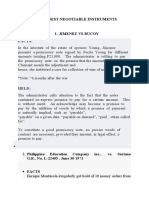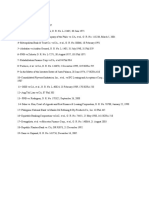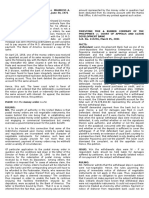0 ratings0% found this document useful (0 votes)
28 viewsPECO vs. Soriano: Kool Kids 2016 - ALS 2D
PECO vs. Soriano: Kool Kids 2016 - ALS 2D
Uploaded by
Kobe Lawrence VeneracionThe Philippine Supreme Court affirmed the decision dismissing PECO's complaint against Soriano regarding a postal money order. The Court ruled that postal money orders are not negotiable instruments under Philippine law because the government issues them to exercise its governmental power for public benefit rather than for commercial transactions. Moreover, restrictions on money orders by postal laws and regulations are inconsistent with negotiable instruments. The Court also noted an agreement between the Manila Post Office and Bank of America regarding refunding amounts related to adverse postal money order claims.
Copyright:
© All Rights Reserved
Available Formats
Download as PDF, TXT or read online from Scribd
PECO vs. Soriano: Kool Kids 2016 - ALS 2D
PECO vs. Soriano: Kool Kids 2016 - ALS 2D
Uploaded by
Kobe Lawrence Veneracion0 ratings0% found this document useful (0 votes)
28 views1 pageThe Philippine Supreme Court affirmed the decision dismissing PECO's complaint against Soriano regarding a postal money order. The Court ruled that postal money orders are not negotiable instruments under Philippine law because the government issues them to exercise its governmental power for public benefit rather than for commercial transactions. Moreover, restrictions on money orders by postal laws and regulations are inconsistent with negotiable instruments. The Court also noted an agreement between the Manila Post Office and Bank of America regarding refunding amounts related to adverse postal money order claims.
Original Title
N-08-03 Peco v. Soriano
Copyright
© © All Rights Reserved
Available Formats
PDF, TXT or read online from Scribd
Share this document
Did you find this document useful?
Is this content inappropriate?
The Philippine Supreme Court affirmed the decision dismissing PECO's complaint against Soriano regarding a postal money order. The Court ruled that postal money orders are not negotiable instruments under Philippine law because the government issues them to exercise its governmental power for public benefit rather than for commercial transactions. Moreover, restrictions on money orders by postal laws and regulations are inconsistent with negotiable instruments. The Court also noted an agreement between the Manila Post Office and Bank of America regarding refunding amounts related to adverse postal money order claims.
Copyright:
© All Rights Reserved
Available Formats
Download as PDF, TXT or read online from Scribd
Download as pdf or txt
0 ratings0% found this document useful (0 votes)
28 views1 pagePECO vs. Soriano: Kool Kids 2016 - ALS 2D
PECO vs. Soriano: Kool Kids 2016 - ALS 2D
Uploaded by
Kobe Lawrence VeneracionThe Philippine Supreme Court affirmed the decision dismissing PECO's complaint against Soriano regarding a postal money order. The Court ruled that postal money orders are not negotiable instruments under Philippine law because the government issues them to exercise its governmental power for public benefit rather than for commercial transactions. Moreover, restrictions on money orders by postal laws and regulations are inconsistent with negotiable instruments. The Court also noted an agreement between the Manila Post Office and Bank of America regarding refunding amounts related to adverse postal money order claims.
Copyright:
© All Rights Reserved
Available Formats
Download as PDF, TXT or read online from Scribd
Download as pdf or txt
You are on page 1of 1
PECO vs. Soriano from the bank’s clearing account.
The Bank of America debited
G.R. No. L-22405 | 39 SCRA 587 | June 30, 1971 | DIZON, J. (reduced) PECO’s account with the same account and give notice by
Petition: Appeal from a decision of the CFI of Manila dismissing complaint mean of debit memo.
filed by PECO against Soriano, et al.
Petitioners: Philippine Education Co., Inc. ISSUES
Respondents: Mauricio A. Soriano, et al. o W/N the Postal Money Order in question is a negotiable instrument. NO
Negotiable Instruments Law; Chapter 1: Form and Interpretation;
Section 8 RULING & RATIO
o Philippine postal statutes were patterned after statutes in force in the US.
DOCTRINE Therefore, they are generally construed in accordance with construction
• In establishing and operating a postal money order system, the given in the US to their own statutes.
government is not engaging in commercial transactions but merely o In the US, postal money orders are not negotiable instruments. This is
exercises a governmental power for public benefit. because in establishing and operating a postal money order system, the
government is not engaging in commercial transactions but merely
Civil Code Provision exercises a governmental power for public benefit.
Chapter 1: Form and Interpretation o Moreover, some restrictions on money orders by postal laws and
Section 8: The instrument is payable to order where it is drawn payable to regulations are inconsistent with the character of negotiable instruments.
the order of a specified person or to him or his order. It may be drawn • For example, (a) such laws usually provide for not more than 1
payable to the order of: endorsement and (b) payment of money orders may be withheld
(a) A payee who is not maker, drawer, or drawee; or under a variety of circumstances
(b) The drawer or maker; or o There was already an agreement between Bank of America and the
(c) The drawee; or Manila Post Office, that in case the post office would have an adverse
(d) Two or more payees jointly; or claim against any Bank of America depositor involving postal money
(e) One or some of several payees; or orders issued by the post office, all amounts cleared in relation thereto
(f) The holder of an office for the time being. shall be refunded back to the post office’s account with the bank. This in
Where the instrument is payable to order, the payee must be named or itself is already a limitation in the negotiability and nature of the postal
otherwise indicated therein with reasonable certainty. money orders issued by the post office because of the special conditions
attached.
FACTS
o Enrique Montinola sought to purchase from Manila Post Office 10 money DISPOSITION
orders of P200 each payable to E.P. Montinola with address at Lucena, o WHEREFORE, the appealed decision being in accordance with law, the
Quezon. Montinola offered to pay for the money orders with private same is hereby affirmed with costs.
checks, which were not generally accepted in payment of money orders.
o The teller advised him to see the Chief of the Money Order Division.
Instead of doing so, Montinola left the building with his own check and 10
money orders without the knowledge of the teller.
o An urgent message was sent to all postmasters and upon all banks
instructing them not to pay anyone if the money orders were presented
for payment. Bank of America received a copy of the notice 3 days later.
o Philippine Education Co., Inc. (PECO) received one of the money orders
as part of its sales receipt. The following day it deposited the same with
Bank of America and it was cleared one day after with the Bureau of
Posts receiving its face value of P200.
o Mauricio Soriano, Chief of the Money Order Division notified Bank of
America that the money order deposited had been found to have been
irregularly issued and that, the amount it represented had been deducted
Kool Kids 2016 | ALS 2D N-08-03 Peco v. Soriano.pdf
AURELIO | BALLESTEROS | BATUNGBACAL | BILIRAN | CADIENTE | DONES | GALLARDO | GESTA | GUBATAN | PINTOR | SY | TOLEDO Page 1 of 1
You might also like
- AttackingAzureAD SlidesNotesDocument299 pagesAttackingAzureAD SlidesNotesmhumaidan.1994No ratings yet
- PPT#11 Contemporary IssueDocument15 pagesPPT#11 Contemporary Issueshi lapsNo ratings yet
- Karina Dogra ThesisDocument93 pagesKarina Dogra ThesisMinh Anh Lê TrầnNo ratings yet
- How to Get Rid of Your Unwanted Debt: A Litigation Attorney Representing Homeowners, Credit Card Holders & OthersFrom EverandHow to Get Rid of Your Unwanted Debt: A Litigation Attorney Representing Homeowners, Credit Card Holders & OthersRating: 3 out of 5 stars3/5 (1)
- 17 - Phil Educ V SorianoDocument3 pages17 - Phil Educ V SorianoPatrice ThiamNo ratings yet
- Negotiable Instruments Case DigestDocument29 pagesNegotiable Instruments Case DigestEvin Megallon Villaruben100% (1)
- PHILIPPINE EDUCATION CO., INC., Plaintiff-Appellant, vs. MAURICIO A. SORIANO, ET AL., Defendants-AppelleesDocument6 pagesPHILIPPINE EDUCATION CO., INC., Plaintiff-Appellant, vs. MAURICIO A. SORIANO, ET AL., Defendants-AppelleesKing BadongNo ratings yet
- Negotiable Instruments Case DigestDocument28 pagesNegotiable Instruments Case DigestJust SanchezNo ratings yet
- Case Digest New 9142022Document6 pagesCase Digest New 9142022Eun Ae YinNo ratings yet
- PECO vs. Soriano: Philippine Education Co. vs. Soriano L-22405 June 30, 1971 Dizon, J.Document3 pagesPECO vs. Soriano: Philippine Education Co. vs. Soriano L-22405 June 30, 1971 Dizon, J.Jeunaj LardizabalNo ratings yet
- CASE #7 Philippine Education Co. Inc. v. SorianoDocument1 pageCASE #7 Philippine Education Co. Inc. v. SorianopistekayawaNo ratings yet
- Case Digest Negotiable InstrumentsDocument18 pagesCase Digest Negotiable InstrumentsStella Bertillo0% (1)
- Philippine Education Co. Inc. V. Soriano (G.R. No. L-22405. June 30, 1971)Document7 pagesPhilippine Education Co. Inc. V. Soriano (G.R. No. L-22405. June 30, 1971)Ipe DimatulacNo ratings yet
- Negotiable Instruments - Case DigestDocument8 pagesNegotiable Instruments - Case DigestKeyba Dela CruzNo ratings yet
- Philippine Education Co Vs SorianoDocument2 pagesPhilippine Education Co Vs SorianoMon Che100% (1)
- Philippine Education Co v. Mauricio Soriano, Et Al.Document2 pagesPhilippine Education Co v. Mauricio Soriano, Et Al.Katrina PerezNo ratings yet
- Nego Case DigestDocument16 pagesNego Case DigestFatimaNo ratings yet
- NIL Syl Digested CasesDocument20 pagesNIL Syl Digested CasesJerik SolasNo ratings yet
- Philippine Education Corporation Vs SorianoDocument6 pagesPhilippine Education Corporation Vs SorianoSo ULNo ratings yet
- Nego Case Digest (GROUP 2)Document24 pagesNego Case Digest (GROUP 2)Mjay GuintoNo ratings yet
- NIL (Midterms) Case Digest CompilationDocument39 pagesNIL (Midterms) Case Digest CompilationMikey GoNo ratings yet
- PHILIPPINE EDUCATION CO., INC., Plaintiff-Appellant, vs. MAURICIO A. SORIANO, ET AL., Defendant-Appellees. (G.R. No. L-22405 June 30, 1971)Document8 pagesPHILIPPINE EDUCATION CO., INC., Plaintiff-Appellant, vs. MAURICIO A. SORIANO, ET AL., Defendant-Appellees. (G.R. No. L-22405 June 30, 1971)GIGI KHONo ratings yet
- Nego For Feb 18Document17 pagesNego For Feb 18MA. TRISHA RAMENTONo ratings yet
- 10 CasesDocument6 pages10 CasesMelfort Girme BayucanNo ratings yet
- Philippine Education CO., INC., Plaintiff-Appellant, MAURICIO A. SORIANO, ET AL., Defendant-AppelleesDocument1 pagePhilippine Education CO., INC., Plaintiff-Appellant, MAURICIO A. SORIANO, ET AL., Defendant-AppelleesCJ FaNo ratings yet
- Negotiable Compiled Cases (Week 1,2 and 3)Document11 pagesNegotiable Compiled Cases (Week 1,2 and 3)jpoy61494No ratings yet
- Negotiable Instruments Cases 1Document51 pagesNegotiable Instruments Cases 1Ronald Paul O. CajucomNo ratings yet
- Caltex (Philippines), Inc. Vs Court of AppealsDocument3 pagesCaltex (Philippines), Inc. Vs Court of AppealsChing ApostolNo ratings yet
- Negotiable Compiled Cases (Week 1,2 and 3)Document12 pagesNegotiable Compiled Cases (Week 1,2 and 3)MoireeGNo ratings yet
- Case Digest in Negotiable Instruments LawDocument33 pagesCase Digest in Negotiable Instruments LawChristopher G. Halnin100% (3)
- 2019 Negotiable Instruments Case DigestDocument33 pages2019 Negotiable Instruments Case DigestEstrellita GlodoNo ratings yet
- Nego Digest CompilationDocument93 pagesNego Digest CompilationBill MarNo ratings yet
- Phil Educ Vs SorianoDocument2 pagesPhil Educ Vs SorianoLizzette Dela PenaNo ratings yet
- Rivera, Lyka A. (3bsa5)Document2 pagesRivera, Lyka A. (3bsa5)Lysss EpssssNo ratings yet
- Elerlenne Lim Negotiable Instruments Law Concept of Negotiable Instruments Gsis vs. Ca 170 Scra 533 FactsDocument8 pagesElerlenne Lim Negotiable Instruments Law Concept of Negotiable Instruments Gsis vs. Ca 170 Scra 533 FactsElerlenne LimNo ratings yet
- NIL Case Digests Complete PDFDocument25 pagesNIL Case Digests Complete PDFPhil JaramilloNo ratings yet
- Case Digests Atty CabochanDocument38 pagesCase Digests Atty CabochanAthena Lajom100% (1)
- Nego Case DigestsDocument20 pagesNego Case Digestsroxdelosreyes100% (3)
- Harvey UpworkDocument63 pagesHarvey UpworkEdmund Earl TimothyNo ratings yet
- Vdocuments - MX - Case Digests Atty CabochanDocument38 pagesVdocuments - MX - Case Digests Atty CabochanRhuejane Gay MaquilingNo ratings yet
- Digested Nego CasesDocument9 pagesDigested Nego CasesBonna De RuedaNo ratings yet
- Philippine Education Co., Inc. vs. SorianoDocument2 pagesPhilippine Education Co., Inc. vs. SorianoKym Algarme0% (1)
- China Banking Corp. v. PadillaDocument6 pagesChina Banking Corp. v. PadillaSGTNo ratings yet
- Negotiable Instrument Compiled CasesDocument3 pagesNegotiable Instrument Compiled CasesAL IribaniNo ratings yet
- Nego Case Digests For CommrevDocument22 pagesNego Case Digests For CommrevDianne Bernadeth Cos-agonNo ratings yet
- Nego - COMM-MOD-5-CDDocument26 pagesNego - COMM-MOD-5-CDlunameru93No ratings yet
- NIL Case Digests CompleteDocument16 pagesNIL Case Digests CompleteRJ PasNo ratings yet
- Case Digest - NegotiabilityDocument3 pagesCase Digest - NegotiabilityChristopher G. HalninNo ratings yet
- Assignment #3Document2 pagesAssignment #3Dana IsabelleNo ratings yet
- Nil Until Sec 15Document53 pagesNil Until Sec 15Mary Joyce Lacambra AquinoNo ratings yet
- Cases 5Document4 pagesCases 5Thoughts and More ThoughtsNo ratings yet
- Commercial Law Case DigestDocument21 pagesCommercial Law Case DigestpacburroNo ratings yet
- Case Digest Compilation Nego Nov 21Document32 pagesCase Digest Compilation Nego Nov 21AaliyahNo ratings yet
- NIL Digest1 InsularDocument3 pagesNIL Digest1 InsularAnna Marie DayanghirangNo ratings yet
- Chan Wan Vs Tan KimDocument12 pagesChan Wan Vs Tan KimCarlo ColumnaNo ratings yet
- Case Digest in NILDocument33 pagesCase Digest in NILChristopher G. HalninNo ratings yet
- 109 Phil 706 - Commercial Law - Negotiable Instruments Law - Negotiation After Dishonor - Holder in Due CourseDocument4 pages109 Phil 706 - Commercial Law - Negotiable Instruments Law - Negotiation After Dishonor - Holder in Due CourseBingoheartNo ratings yet
- Case (Digests) in Credit TransactionsDocument31 pagesCase (Digests) in Credit TransactionsjafernandNo ratings yet
- (G.R. No. L-22405. June 30, 1971) Case DigestDocument1 page(G.R. No. L-22405. June 30, 1971) Case DigestRusty NomadNo ratings yet
- Philippine Education Co Vs Soriano DigestDocument1 pagePhilippine Education Co Vs Soriano DigestcolleenNo ratings yet
- Case #8, Batch 2 Bank of The Philippine Islands V. Casa Montessori Internationale G.R. No. 149454 May 28, 2004Document8 pagesCase #8, Batch 2 Bank of The Philippine Islands V. Casa Montessori Internationale G.R. No. 149454 May 28, 2004Benz Clyde Bordeos TolosaNo ratings yet
- Case Digest Number 3Document8 pagesCase Digest Number 3Pat EspinozaNo ratings yet
- Case Digest - General Banking ActDocument15 pagesCase Digest - General Banking ActAiko DalaganNo ratings yet
- Anson Trade Center vs. Pacific BankingDocument2 pagesAnson Trade Center vs. Pacific BankingKobe Lawrence VeneracionNo ratings yet
- Guidelines in Imposition of Community Service ActDocument7 pagesGuidelines in Imposition of Community Service ActKobe Lawrence VeneracionNo ratings yet
- AMLA (As Amended)Document19 pagesAMLA (As Amended)Kobe Lawrence VeneracionNo ratings yet
- Metroplex Berhad v. Sinophil Corp.20211222-12-172o893Document11 pagesMetroplex Berhad v. Sinophil Corp.20211222-12-172o893Kobe Lawrence VeneracionNo ratings yet
- PPSA Reviewer PDFDocument15 pagesPPSA Reviewer PDFKobe Lawrence VeneracionNo ratings yet
- Application of An Existing Corporation To Increase Its Foreign Equity Under The Foreign Investments Acts of 1991Document2 pagesApplication of An Existing Corporation To Increase Its Foreign Equity Under The Foreign Investments Acts of 1991Kobe Lawrence VeneracionNo ratings yet
- rr16-2005 2Document55 pagesrr16-2005 2Kobe Lawrence VeneracionNo ratings yet
- 206131-2017-Metropolitan Bank and Trust Co. v. Liberty20211014-12-CgooftDocument18 pages206131-2017-Metropolitan Bank and Trust Co. v. Liberty20211014-12-CgooftKobe Lawrence VeneracionNo ratings yet
- Philippine Plastics Industry Association20210424-12-15y6pxzDocument7 pagesPhilippine Plastics Industry Association20210424-12-15y6pxzKobe Lawrence VeneracionNo ratings yet
- California Manufacturing Corporation v. LaguesmaDocument2 pagesCalifornia Manufacturing Corporation v. LaguesmaKobe Lawrence VeneracionNo ratings yet
- GMCR Inc. v. Bell Telecommunication20210507-12-1zbfn1Document17 pagesGMCR Inc. v. Bell Telecommunication20210507-12-1zbfn1Kobe Lawrence VeneracionNo ratings yet
- (Vers. 2 SPECPRO) Rule 73-77 (Digests This)Document30 pages(Vers. 2 SPECPRO) Rule 73-77 (Digests This)Kobe Lawrence VeneracionNo ratings yet
- Corporate Social Responsibility and Customer Loyalty in Islamic Banks of Pakistan 1532 5806 22 SI 157Document7 pagesCorporate Social Responsibility and Customer Loyalty in Islamic Banks of Pakistan 1532 5806 22 SI 157AULIA SU ASTIKA DEWINo ratings yet
- FarmaclinicDocument11 pagesFarmaclinicjay alsopNo ratings yet
- MOF Company, Inc. v. Shin Yang Brokerage Corp.Document11 pagesMOF Company, Inc. v. Shin Yang Brokerage Corp.Iris MendiolaNo ratings yet
- Training Development Literature ReviewDocument8 pagesTraining Development Literature Reviewea7w32b0100% (1)
- IVR-8117994011-01 - Rev.00Document6 pagesIVR-8117994011-01 - Rev.00Abhay KarandeNo ratings yet
- Managerial Economics 2Document36 pagesManagerial Economics 2Yogesh GirgirwarNo ratings yet
- Managerial Economics Applications Strategies and Tactics 14th Edition Mcguigan Test BankDocument11 pagesManagerial Economics Applications Strategies and Tactics 14th Edition Mcguigan Test Bankclementbacrfb26100% (36)
- Chapter 8Document22 pagesChapter 8doha safwatNo ratings yet
- Case Study On Yes BankDocument4 pagesCase Study On Yes BankAMAN PANDEYNo ratings yet
- Ibrahim Zoaib ResumeDocument4 pagesIbrahim Zoaib ResumeIbrahim ZoaibNo ratings yet
- E TicketDocument3 pagesE TicketDurga PrasadNo ratings yet
- Small Industries Development Organization (SIDO)Document7 pagesSmall Industries Development Organization (SIDO)Lissy lourdu Ilakiyya ENo ratings yet
- Future Organizational Design by Lars Groth - Creative Commons Edition 1.1Document476 pagesFuture Organizational Design by Lars Groth - Creative Commons Edition 1.1Alex AndersonNo ratings yet
- Amway Plan Vs OthersDocument12 pagesAmway Plan Vs OtherschandanNo ratings yet
- IIT-Bombay WashU EMBA BrochureDocument28 pagesIIT-Bombay WashU EMBA Brochuregaurav_chughNo ratings yet
- Nieves Asensio Thomas 10839267 MSC BADocument64 pagesNieves Asensio Thomas 10839267 MSC BAmuj_aliNo ratings yet
- Virgin Mobile - Case StudyDocument13 pagesVirgin Mobile - Case StudyPurnendu Singh0% (1)
- BBA Unit 3Document11 pagesBBA Unit 3Somnath DasNo ratings yet
- ITR Compilation 4u5346Document4 pagesITR Compilation 4u5346akhil kwatraNo ratings yet
- Zamil Steel ManualDocument469 pagesZamil Steel ManualDhanu Padhu83% (6)
- The Aperture For Modern CEOs: Aligning Purpose and FocusDocument47 pagesThe Aperture For Modern CEOs: Aligning Purpose and FocusCharlene KronstedtNo ratings yet
- A Study On Recruitment and Selection Process Organization With The Help of Recruiting AgencyDocument10 pagesA Study On Recruitment and Selection Process Organization With The Help of Recruiting AgencyHimanshi SharmaNo ratings yet
- Revised Format of SH-4Document2 pagesRevised Format of SH-4legal shuruNo ratings yet
- Resume in Word Doc or PDFDocument5 pagesResume in Word Doc or PDFgvoimsvcf100% (2)
- Iii. The Impact of Information Technology: Successful Communication - Key Points To RememberDocument7 pagesIii. The Impact of Information Technology: Successful Communication - Key Points To Remembermariami bubuNo ratings yet
- Study Text Cma Caf 3Document606 pagesStudy Text Cma Caf 3Muhammad KashifNo ratings yet




































































































